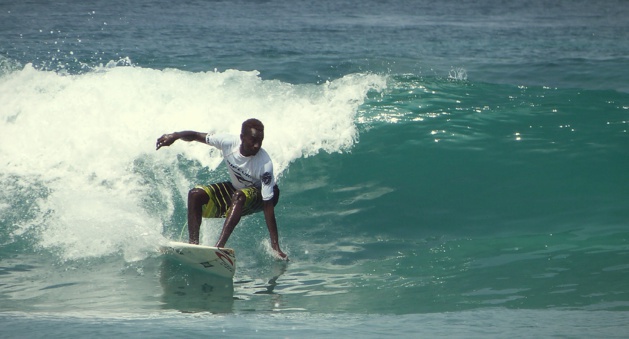
Credits Thomas Delattre
The sea breeze offers a welcome reprieve from the Dakar heat. Plastic chairs creak under the weight of parents who have come to cheer on their children. Others, cameras in hand, capture the scenes as they slalom between street sellers who are taking advantage of the event to sell sunglasses and African artifacts.
Stood in the judges tent, Oumar Seye is giving instructions to the competitors. Facing him are the young hopes of Senegalese surfing. They wait for the wave. The best among them could make it to the Rip Curl Africa Tour, which holds the promise of a sponsorship deal with a big brand.
Oumar Seye is excited. Bare chested, this enormous former professional surfer, the first man from Senegal to have signed for Rip Curl, is now the president of the federation. As the head of a water sports centre, he has devoted his career to the development of surfing along the coasts of Africa. "When I started, it was very difficult to find surfboards. My first board was given to me by a journalist" he explains enthusiastically.
The sport, practised in Senegal since the 1960's, has long been the preserve of foreign professionals who come to spend the winter season in the sun. The few Senegalese who took an interest in surfing came largely from the Lebou community of fisherman who reside in the Ngor neighbourhood. Most locals don't have the financial means to buy expensive equipment, and so they look to trade with departing tourists in order to get their hands on a surfboard, Oumar Seye explains. It wasn't until the early 2000's, with the establishment of the first surf schools, that the discipline really started to become coordinated. The creation of the Senegalese Surfing Federation in 2005 finally made the sport official, and facilitated the start of a dialogue with the Sports Minister regarding the implementation of funding.
Since 2009 Oumar has been organising the West Africa Tour, a competition which brings together surfers from across West Africa and Europe. "If there is a Tour, there will be prizes, and the surfers will come, that's the idea of the Africa Tour" he says, "I want every country in West Africa to be able to send their surfers here, and we believe in our project" he adds with a smile. The tour, celebrating it's 7th anniversary this year, represents an enormous hope for Senegal, attracting tourists, sponsors, and of course, cash.
"Tourism has helped to develop surfing here"
The surf camps in Dakar have grown in recent years, offering tourists intensive courses of one or two weeks, a practice which has come under fire from Oumar; "They're only interested in the money" he claims, "I'm trying to look at the long term". If the influx of foreigners allows the locals to get hold of equipment, and so be better prepared at less cost, the champion surfer advocates a "humane" tourism based on meeting and trading, "A surfer from Europe who comes to Senegal is going to eat with the locals, surf with them, hang out with them" he enthuses.
Poncho, a French surf school manager who has been in Senegal since early 2000, has noted the evolution in Dakar over the last 15 years. "It took about ten years before people started to trust me, probably due to surfing's poor reputation; the long hair, smoking joints" he admits. "Today my clientele is 70% groups of friends, 30% families, who come to Dakar just to surf, and that works nicely". But surf-tourism in Senegal has to cope with competition, particularly from Morocco. "They work on a huge scale with all inclusive holidays, and flights to Senegal are 30% more expensive" he laments. "Coming to Dakar to surf is not cheap".
"The urbanisation of Dakar is out of control"
The massive urbanisation of Dakar in recent years has left many problems with pollution in its wake, and has been the bane of the lives of the city's environmentalists. "For 12 years I've been warning people" says Poncho, who bemoans the lack of government action, "The laws here are exactly the same as those in France, but we let them slide". The industrial practice of dumping heavy metals in the ocean has great repercussions for the wildlife. Monkfish can no longer be exported due to high rates of mercury found in its body. Pollution could well be the main enemy of tourism in Dakar, which Poncho is quick to label an abandoned city "the powers that don't care about Dakar, they want the tourists to go to the holiday resorts, like Saly".
Cleaning the beaches of the Senegalese capital relies solely on a few private initiatives. Each year the Dakar Women's Group organise the ‘Ngor Beach Clean-up’, a huge clean-up operation on Ngor beach, but these isolated actions will not resolve the pollution problem. According to a decree on 22nd of July 2014, the new environment minister, Abdoulaye Bibi Baldé, must ensure that "potentially polluting activities do not jeopardize living conditions or the quality of the environment". While Poncho agrees "that a genuine will on the part of politicians can change things", he remains doubtful as to when these wishes will be carried out. "We'll see" he adds, shrugging his shoulders.




























